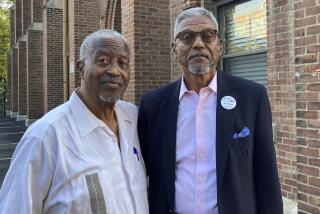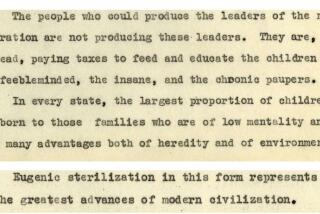Clinton Apologizes for Radiation Tests : Experiments: Cabinet will study compensation for some victims and their families. About 4,000 secret studies through 1974 were disclosed.
WASHINGTON — President Clinton apologized Tuesday to the survivors and families of those who unknowingly were subjects of government-sponsored radiation experiments, and ordered his Cabinet to devise a system of relief--including financial compensation.
“When the government does wrong, we have a moral responsibility to admit it,” Clinton said. “The duty we owe to one another to tell the truth and to protect our fellow citizens from excesses like these is one we can never walk away from.”
Saying “our government failed in that duty,” he apologized “to all the American people who must be able to rely upon the United States to keep its word to tell the truth and to do the right thing.”
Clinton made the remarks as he accepted the recommendations of an advisory committee he appointed to study the secret experiments, which began in 1944 and continued for three decades.
Although the panel studied about 4,000 radiation experiments that took place during that period, it recommended that only a handful of victims receive compensation. Panel members specifically cited three experiments, including one project where 18 hospital patients, most of them terminally ill, were unknowingly injected with plutonium to determine how long the substance would remain in their body.
The committee recommended that several subjects of total-body irradiation experiments conducted during World War II, and the subject of a zirconium injection experiment, known only as Cal-Z, also be included.
Nevertheless, Administration officials appeared to leave the door open for additional restitution. Energy Secretary Hazel O’Leary said in an interview that there could be “thousands, many thousands” of individuals who deserve payment but stressed that both the government and the panel have been hampered by poor or nonexistent record-keeping during that time.
Since her department’s investigation began, “of the 10,000 calls we received, about 3,000 individuals gave us enough information to enable us to look in records and, in all the searching of a quarter of a million pages, we found only 50 names,” she said.
In the case of the 18 subjects of plutonium injections, however, she said discussions regarding compensation would begin immediately with their families.
The experiment, conducted from 1945 to 1947, was deemed necessary at the time to assess the risks that workers faced when exposed to such materials. One patient was injected at Oak Ridge Hospital in Oak Ridge, Tenn., 11 at the University of Rochester, three at the University of Chicago and three at a University of California campus. It was unclear which facility was involved.
O’Leary said the funds would come out of her department’s budget. “We are ready and willing to begin a negotiation. One thing all of us want to avoid is a protracted and expensive lawsuit against the government.”
Clinton also ordered a review of the procedures for government-sponsored research on humans and said he will create a bioethics advisory panel to police the research process to “see to it that never again do we stray from the basic values of protecting our people and being straight with them.”
He acknowledged that medical and scientific progress “depends upon learning about people’s responses to new medicines, to new cutting-edge treatments, . . . but there is a right way and a wrong way to do it.”
The work began when many such studies were undertaken in secret to help understand radiation risks to workers involved in the development of the atomic bomb. This was long before it became standard practice to issue “informed consent” to medical research subjects, laying out the risks and benefits of participation.
Clinton said some of the experiments performed during that period “were unethical not only by today’s standards but by the standards of the time. They failed both the test of our national values and the test of humanity.”
The experiments “were shrouded not for a compelling reason of national security but for the simple fear of embarrassment, and that was wrong,” he added.
The experiments ended in 1974, when the government recognized the need to protect human subjects and established regulations that govern human research.
More to Read
Sign up for Essential California
The most important California stories and recommendations in your inbox every morning.
You may occasionally receive promotional content from the Los Angeles Times.










